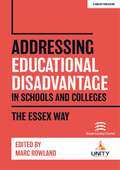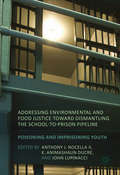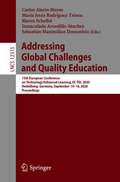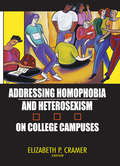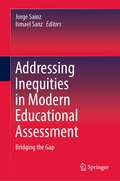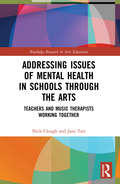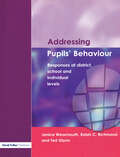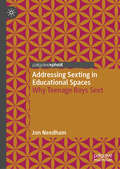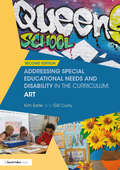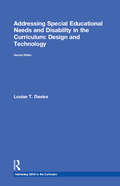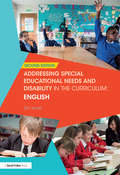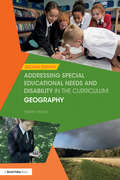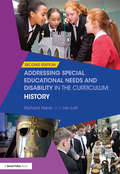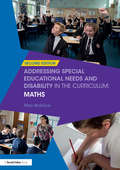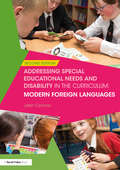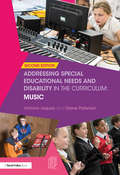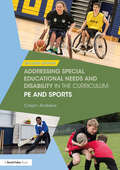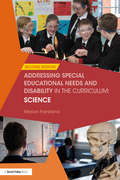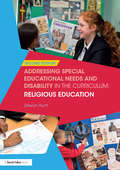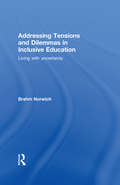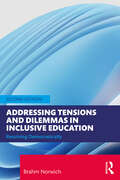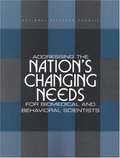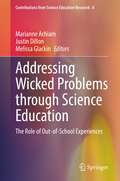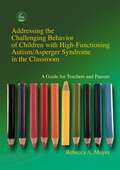- Table View
- List View
Addressing Educational Disadvantage in Schools and Colleges: The Essex Way
by Marc RowlandThe genesis for this book, and the strategy within it, is a longstanding commitment from Essex County Council to improve the life chances and life choices of disadvantaged pupils being educated in Essex.The purpose of the book is to set out a strategic, evidence-informed approach with pupils, families, teachers, leaders, system leaders and wider agencies which puts learners first. This approach is rooted in best practice. It centres on improving the day to day learning experiences of disadvantaged pupils, leading to better long term choice and opportunity. Unity Research School and Essex County Council hope it will support efforts to address the impact of socio-economic disadvantage on learning in schools and colleges nationally.
Addressing Educational Disadvantage in Schools and Colleges: The Essex Way
by Marc RowlandThe genesis for this book, and the strategy within it, is a longstanding commitment from Essex County Council to improve the life chances and life choices of disadvantaged pupils being educated in Essex.The purpose of the book is to set out a strategic, evidence-informed approach with pupils, families, teachers, leaders, system leaders and wider agencies which puts learners first. This approach is rooted in best practice. It centres on improving the day to day learning experiences of disadvantaged pupils, leading to better long term choice and opportunity. Unity Research School and Essex County Council hope it will support efforts to address the impact of socio-economic disadvantage on learning in schools and colleges nationally.
Addressing Environmental and Food Justice toward Dismantling the School-to-Prison Pipeline: Poisoning and Imprisoning Youth
by John Lupinacci Anthony J. Nocella K. Animashaun DucreThis cutting-edge collection of essays presents to the reader leading voices within food justice, environmental justice, and school to prison pipeline movements. While many schools, community organizers, professors, politicians, unions, teachers, parents, youth, social workers, and youth advocates are focusing on curriculum, discipline policies, policing practices, incarceration demographics, and diversity of staff, the authors of this book argue that even if all those issues are addressed, healthy food and living environment are fundamental to the emancipation of youth. This book is for anyone who wants to truly understand the school to prison pipeline as well as those interested in peace, social justice, environmentalism, racial justice, youth advocacy, transformative justice, food, veganism, and economic justice.
Addressing Global Challenges and Quality Education: 15th European Conference on Technology Enhanced Learning, EC-TEL 2020, Heidelberg, Germany, September 14–18, 2020, Proceedings (Lecture Notes in Computer Science #12315)
by Maren Scheffel María Jesús Rodríguez-Triana Carlos Alario-Hoyos Inmaculada Arnedillo-Sánchez Sebastian Maximilian DennerleinThis book constitutes the proceedings of the 15th European Conference on Technology Enhanced Learning, EC-TEL 2020, held in Heidelberg, Germany, in September 2020. The 24 research papers and 20 demo and 5 poster papers presented in this volume were carefully reviewed and selected from 91 submissions. The European Conference on Technology-Enhance Learning, which celebrates its 15th anniversary this year, is committed to address global challenges and quality education. The papers deal with the Sustainable Development Goals, particularly SDG 4 and SDG 10, to help to reduce the existing gaps and inequalities between countries and regions from around the world in terms of inclusiveness, equity, access, and quality of education.The chapters: “Designing an Online Self-Assessment for Informed Study Decisions: The User Perspective”; “Living with Learning Difficulties: Two Case Studies Exploring the Relationship Between Emotion and Performance in Students With Learning Difficulties”; “Applying Instructional Design Principles on Augmented Reality Cards for Computer Science Education”; and “Teaching Simulation Literacy With Evacuations - Concept, Technology, and Material for a Novel Approach” are available open access under a Creative Commons Attribution 4.0 International License via link.springer.com. Due to the Corona pandemic EC-TEL 2020 was held as an virtual event.
Addressing Homophobia and Heterosexism on College Campuses
by Elizabeth CramerThis book presents an integrated approach toward changing attitudes about lesbian, gay, bisexual, and transgendered (LGBT) students, faculty, and staff on contemporary college campuses. From Addressing Homophobia and Heterosexism on College Campuses you can learn specific classroom techniques for handling homophobia and heterosexism in the classroom. This book tackles a wide variety of subjects including academic freedom, diversity training, nontraditional families, and religion, each of which plays an integral part in the sense of community found on any college campus. Addressing Homophobia and Heterosexism on College Campuses provides you with the basic tools to set up sensible programs that have worked for others in the past and can work for you in the future! In Addressing Homophobia and Heterosexism on College Campuses you'll also find: a list of helpful feature films and documentaries case studies from the US, Canada, and Australia methods to combat homophobia and heterosexism among social work students practical ways to set up Safe Zone or Allies programs techniques for reducing "trans-anxieties" lectures and role-playing games geared toward changing thoughts and live
Addressing Inequities in Modern Educational Assessment: Bridging the Gap
by Jorge Sainz Ismael SanzThis edited book focuses on the central and up-to-date issues that represent some of the most relevant challenges and limitations of International Learning Assessments (ILSAs). It specifically sheds light on the general effects of the discontinuation of face-to-face education on students at diverse academic levels during the COVID-19 pandemic.Through the lens of the most relevant experts of the field, it highlights the asymmetric effects on students based on family income, education level, or employment, imposing a heavy toll on those with less resources.It raises issues regarding the impact on the mental health of students and education professionals due to school closures. Modern education is shifting its focus from just scores to detailed, qualitative feedback. Such comprehensive insights help students identify both strengths and growth areas, making assessments more constructive.This book is aimed for researchers in the field of educational assessments, graduate and postgraduate students, policy makers, and anyone interested in making informed decisions regarding ILSAs. COVID-19 brought immense educational challenges, it also presented an unprecedented opportunity: to reassess and reform existing systems, steering towards assessments that are both fair and empowering.
Addressing Issues of Mental Health in Schools through the Arts: Teachers and Music Therapists Working Together (Routledge Research in Arts Education)
by Jane Tarr Nick CloughThis book outlines how teachers, music / arts therapists and teacher trainers have engaged in participatory action research to facilitate regular group music listening and improvisational music making with children and young people in their classrooms, highlighting its impact in addressing issues of mental health and providing social and emotional access to learning. The book includes examples of classroom practice, evidencing how safe, inclusive and interactive music making can stimulate experiences that alter children and young people’s moods, enhance their social skills and enable their connectivity with each other and with learning. It describes participatory action research approaches that support inter professional learning between teachers and music / arts therapists. Five narrative accounts of classroom episodes provide a basis for continuing reflection and critical theorising about young people’s relational health and sensory engagement. The book explores outcomes from non-verbal dialogic interaction and attachment focussed practices. It advocates new forms of rights respecting professionalism. Providing new frameworks with which to enhance the wellbeing of vulnerable children and young people in classroom settings, the book will be important reading for researchers and students in the fields of inclusive education, music / arts therapy and teacher training. The contents are significant for practitioners looking to support children and young people’s recovery and reconnections in the classroom.
Addressing Pupil's Behaviour: Responses at District, School and Individual Levels
by Janice Wearmouth Ted Glynn Robin C. RichmondThe challenges posed by the behavior of some pupils can only be properly addressed if support is extended beyond the classroom. Linking theory and practice, this book outlines a range of assessment and intervention techniques at: * District and community level * School level * Classroom level * Individual level
Addressing Sexting in Educational Spaces: Why Teenage Boys Sext (Studies in Childhood and Youth)
by Jon NeedhamThis book highlights the findings from the largest study of its kind undertaken in the United Kingdom that investigated the behaviours, of teenage boys, as they reflect on the extent and motivations associated with the sending and receiving of self-generated sexual images and messages (sexting). Based on a cross-sectional research study that examined the sexting behaviour data of boys 14-18, this book allows the voice of the teenagers to be heard alongside the interpretation and consideration of qualitative data collected from the study and semi-structured interviews. The book attempts to answer questions surrounding the prevalence of adolescent practice and the intersection between the individual and the contextual elements of sexting that effect motivation. Dr Needham examines the relationship between behaviour and sexual identity and the impact of age, ethnicity, relationships, pornography, and faith. The recommendations suggested challenge curriculum, policy and practice development relating to how teenage sexting is framed and proposes a new approach with a sexting typology that addresses the &‘why&’ behind the motivation to sext, rather than just examining the &‘what&’ of message content.
Addressing Special Educational Needs and Disability in the Curriculum: Art (Addressing SEND in the Curriculum)
by Kim Earle Gill CurryThe SEND Code of Practice (2015) reinforced the requirement that all teachers must meet the needs of all learners. This topical book provides practical, tried and tested strategies and resources that will support teachers in making art lessons accessible and interesting for all pupils, including those with special needs. The authors draw on a wealth of experience to share their understanding of special educational needs and disabilities and show how the art teacher can reduce or remove any barriers to learning. Offering strategies that are specific to the context of art teaching, this book will enable teachers to: develop students’ understanding, appreciation and enjoyment of art and design; advance students’ sense of enquiry about visual and tactile experiences; help pupils to realise their creative intentions, through the development of technical competence and manipulative skills; provide opportunities for personal and imaginative enquiry; sample a variety of art and design projects to use in their own lessons; plan the classroom layout and display to enhance learning; successfully train, and fully use the support of, their teaching assistants. An invaluable tool for continuing professional development, this text will be essential for secondary art teachers (and their teaching assistants) seeking guidance specific to teaching art to all pupils, regardless of their individual needs. The book will also be of interest to secondary SENCOs, senior management teams and ITT providers. Full of practical ideas and inspiration, and supported by free online resources, this is an essential tool for art teachers and teaching assistants and will help to deliver successful, inclusive lessons for all pupils.
Addressing Special Educational Needs and Disability in the Curriculum: Design And Technology (Addressing SEND in the Curriculum)
by Louise T. DaviesThe SEND Code of Practice (2015) reinforced the requirement that all teachers must meet the needs of all learners. This topical book provides practical, tried-and-tested strategies and resources that will support teachers in making design and technology lessons accessible and interesting for all pupils, including those with special educational needs. The author draws on a wealth of experience to share her understanding of special educational needs and disabilities and show how the design and technology teacher can reduce or remove any barriers to learning. Offering strategies that are specific to the context of design and technology teaching, this book will enable teachers to: better identify a student’s particular learning requirements; set inclusive design and making assignments which allow all students to participate and succeed; build students’ confidence in using a range of materials and tools; assist with design tasks where pupils take ownership of their work and learning; adapt the classroom environment to meet the needs of pupils; create a mutually supportive classroom which maximises learning opportunities. An invaluable tool for continuing professional development, this text will be essential for design and technology teachers (and their teaching assistants) seeking to include and motivate all pupils in their lessons, regardless of their individual needs. This book will also be of interest to secondary SENCOs, senior management teams and ITT providers. In addition to free online resources, a range of appendices provide design and technology teachers with a variety of pro forma and activity sheets to support effective teaching. This is an essential tool for design and technology teachers and teaching assistants, and will help to deliver successful, inclusive lessons for all pupils.
Addressing Special Educational Needs and Disability in the Curriculum: English (Addressing SEND in the Curriculum)
by Tim HurstThis book provides practical strategies and resources that have been proven effective in teaching English to pupils of all abilities, making English accessible, challenging and exciting. The author outlines important key principles that should underpin teaching and learning so that all pupils, including those with special educational needs, can enjoy the subject and make outstanding progress. The ideas and guidance draw on a wealth of experience, providing classroom activities and free online resources, which can be combined with different teaching approaches. A range of appendices provides teachers with real-life case studies and examples and templates for supporting pupils with SEND. Offering strategies that are specific to the context of English teaching, this book will enable teachers and their teaching assistants to: develop pupils’ understanding by engaging multi-sensory approaches; ensure all pupils are able to participate fully in lessons and achieve success; design and use individual plans for pupils with SEND; assess and adapt content and resources when differentiating materials for pupils with a wide range of learning needs; use formative assessments to measure learning and inform planning. An invaluable tool for whole-school continuing professional development, this fully revised text will be essential for teachers and their teaching assistants seeking guidance specific to teaching English to all pupils, regardless of their individual needs. This book will also be of interest to SENDCOs, learning support units and senior management teams as well as to teacher-training professionals.
Addressing Special Educational Needs and Disability in the Curriculum: Geography (Addressing SEND in the Curriculum)
by Helen HarrisThe SEND Code of Practice (2015) reinforced the requirement that all teachers must meet the needs of all learners. This topical book provides practical, tried and tested strategies and resources that will support teachers in making geography lessons accessible and interesting for all pupils, including those with special needs. The author draws on a wealth of experience to share her understanding of individual needs and show how the geography teacher can reduce or remove any barriers to learning. Offering strategies that are specific to the context of geography teaching, this book will enable teachers to: ensure all pupils are able to participate in every lesson; provide inclusive fieldwork opportunities that take into consideration the needs of all pupils; use formative assessments to measure learning and inform planning; plan the classroom layout and display to enhance learning; successfully use the support of their teaching assistants. An invaluable tool for continuing professional development, this text will be essential for middle school and secondary geography teachers (and their teaching assistants) who are committed to creating an inclusive learning environment for all pupils, regardless of their individual needs. The book will also be of interest to SENCOs and inclusion managers, curriculum co-ordinators, senior management teams and ITT providers. Full of practical ideas and inspiration, and supported by free online resources, this is an essential tool for geography teachers and teaching assistants who want to deliver successful, inclusive lessons for all pupils.
Addressing Special Educational Needs and Disability in the Curriculum: History (Addressing SEND in the Curriculum)
by Richard Harris Ian LuffThe SEND Code of Practice (2015) has reinforced the requirement that all teachers must meet the needs of all learners. This topical book provides practical, tried and tested strategies and resources that will support teachers in making history lessons accessible and exciting for all pupils, including those with special needs. The authors draw on a wealth of experience to share their understanding of special educational needs and disabilities and show how the history teacher can reduce or remove any barriers to learning. Offering strategies that are specific to the context of history teaching, this fully revised edition will enable teachers to: Make history education accessible and engaging to pupils of all abilities Create an inclusive classroom environment that responds to the emotional needs of the class and nurtures a culture of learning Develop inclusive practical demonstration and role play techniques to aid conceptual understanding Set assessment objectives Deploy in-class support effectively An invaluable tool for continuing professional development, this text will be essential for teachers (and their teaching assistants) seeking guidance specific to teaching history to all pupils, regardless of their individual needs. This book will also be of interest to SENDCOs, senior management teams and ITT providers. In addition to practical activities and supporting material contained in the book, there are also free online resources for readers to download and use in the preparation of successful, inclusive lessons for all pupils.
Addressing Special Educational Needs and Disability in the Curriculum: Maths (Addressing SEND in the Curriculum)
by Max WallaceThe SEND Code of Practice (2015) reinforced the requirement that all teachers must meet the needs of all learners. This topical book provides practical, tried and tested strategies and resources that will support teachers in making maths lessons accessible and interesting for all pupils, including those with special needs. The author draws on a wealth of experience to share his understanding of special educational needs and disabilities and show how the maths teacher can reduce or remove any barriers to learning. Offering strategies that are specific to the context of maths teaching, this book will enable teachers to: adopt a ‘problem solving’ approach to ensure students use and apply mathematics at all times during their learning develop students’ understanding of mathematical ideas structure lessons to empower and actively engage students create a mutually supportive classroom which maximises learning opportunities plan the classroom layout and display to enhance learning, for example displaying number lines, vocabulary lists and pupils’ work successfully train and fully use the support of their teaching assistants. An invaluable tool for continuing professional development, this text will be essential for secondary maths teachers (and their teaching assistants) seeking guidance specific to teaching maths to all pupils, regardless of their individual needs. This book will also be of interest to secondary SENCOs, senior management teams and ITT providers. In addition to free online resources, a range of appendices provide maths teachers with a variety of pro forma and activity sheets to support effective teaching. This is an essential tool for maths teachers and teaching assistants, and will help to deliver successful, inclusive lessons for all pupils.
Addressing Special Educational Needs and Disability in the Curriculum: Modern Foreign Languages (Addressing SEND in the Curriculum)
by John ConnorThe SEND Code of Practice has reinforced the requirement that all teachers must meet the needs of all learners. This book provides practical, tried and tested strategies and resources that will support teachers in making modern foreign languages accessible, challenging and exciting for all pupils, including those with special needs. The author draws on a wealth of experience to share his understanding of how SEND can affect learning and how the MFL teacher can reduce or remove any barriers to learning. Offering strategies that are specific to the context of MFL teaching, this book will enable teachers to: ensure all pupils are able to participate fully in every lesson; develop pupils’ understanding, motivation and enjoyment; adapt content and resources when differentiating materials for pupils with a wide range of learning needs; use formative assessments to measure learning. An invaluable tool for whole-school continuing professional development, this text will be essential for teachers (and their teaching assistants) seeking guidance specific to teaching languages to all pupils, regardless of their individual needs. This book will also be of interest to SENCOs, senior management teams and ITT providers.
Addressing Special Educational Needs and Disability in the Curriculum: Music (Addressing SEND in the Curriculum)
by Diane Paterson Victoria JaquissThe SEND Code of Practice (2015) has reinforced the requirement that all teachers must meet the needs of all learners. This topical book provides practical, tried and tested strategies and resources that will support teachers in making music lessons accessible and exciting for all pupils, including those with special needs. The authors draw on a wealth of experience to share their understanding of special educational needs and disabilities and show how the music teacher can reduce or remove any barriers to learning. Offering strategies that are specific to the context of music teaching, this book will enable teachers to: ensure all pupils are able to enjoy and appreciate music; find the appropriate musical instruments to suit the individual learner; develop approaches for teaching composition in mixed ability classrooms; provide opportunities for different types of performance; adapt content, approaches and resources for pupils with a wide range of learning needs. An invaluable tool for continuing professional development, this text will be essential for teachers (and their teaching assistants) seeking guidance specific to teaching music to all pupils, regardless of their individual needs. This book will also be of interest to SENCOs, senior management teams and ITT providers. In addition to free online resources, a range of appendices provides music teachers with lesson case studies, behaviour plans and guidance on behaviour management and effective teaching. This is an essential tool for music teachers and teaching assistants, and will help to deliver successful inclusive lessons for all pupils.
Addressing Special Educational Needs and Disability in the Curriculum: PE and Sports (Addressing SEND in the Curriculum)
by Crispin AndrewsThis topical book provides practical, tried and tested strategies and resources that will support teachers in making PE lessons accessible, rewarding and exciting for all pupils, including those with special needs. The author draws on a wealth of experience to share his understanding of special educational needs and disabilities and show how the PE teacher can reduce or remove any barriers to learning participation. Offering strategies that are specific to the context of PE and sports teaching, this book will enable teachers to: ensure all pupils are able to enjoy and appreciate the value of exercise and sport; create an inclusive environment; tailor activities to fit the needs of mixed ability groups; help pupils to develop the skills and confidence to enjoy different kinds of sport; encourage young people to think about what they are doing and make appropriate decisions for themselves. An invaluable tool for continuing professional development, this text will be essential for teachers, coaches and teaching assistants seeking guidance specific to teaching PE and sport to all pupils, regardless of their individual needs. This book will also be of interest to SENCOs, senior management teams and ITT providers. With free online material and practical resources in the appendices, this is an essential tool for everyone striving to engage all pupils in PE and sport.
Addressing Special Educational Needs and Disability in the Curriculum: Science (Addressing SEND in the Curriculum)
by Marion FranklandThe SEND Code of Practice (2015) reinforced the requirement that all teachers must meet the needs of all learners. This topical book provides practical, tried and tested strategies and resources that will support teachers in making science lessons accessible and exciting for all pupils, including those with special needs. The author draws on a wealth of experience to share her understanding of special educational needs and disabilities and show how science teachers can reduce or remove any barriers to learning. Offering strategies that are specific to the context of science teaching, this book will enable teachers to: help all students develop their ‘evidence-gathering’ skills and aid their scientific discovery by involving the use of all of the senses and structuring tasks appropriately; create a supportive environment that maximises learning opportunities; plan the classroom layout and display to enhance learning; use technology to adapt lessons to the needs of individual pupils; successfully train and fully use the support of their teaching assistants. An invaluable tool for continuing professional development, this text will be essential for teachers (and their teaching assistants) seeking guidance specific to teaching science to all pupils, regardless of their individual needs. This book will also be of interest to SENCOs, senior management teams and ITT providers. In addition to free online resources, a range of appendices provide science teachers with a variety of writing frames and activity sheets to support effective teaching. This is an essential tool for science teachers and teaching assistants, and will help to deliver successful, inclusive lessons for all pupils.
Addressing Special Educational Needs and Disability in the Curriculum: Second Edition (Addressing SEND in the Curriculum)
by Dilwyn HuntThe SEND Code of Practice (2015) reinforced the requirement that all teachers must meet the needs of all learners. This topical book provides practical, tried and tested strategies and resources that will support teachers in making RE lessons accessible and interesting for all pupils, including those with special needs. The author draws on a wealth of experience to share his understanding of special educational needs and disabilities and show how the RE teacher can reduce or remove any barriers to learning. Offering strategies that are specific to the context of RE teaching, this book will enable teachers to: create a supportive environment which maximises learning opportunities; plan the classroom layout and display to enhance learning; help students of all levels to gain confidence in their reading and writing ability; stimulate discussion and develop thinking skills through using stimuli such as religious art, music, artefacts and films; successfully train and fully use the support of their teaching assistants. An invaluable tool for continuing professional development, this text will be essential for teachers (and their teaching assistants) seeking guidance specific to teaching RE to all pupils, regardless of their individual needs. This book will also be of interest to SENCOs, senior management teams and ITT providers. In addition to free online resources, a range of appendices provide RE teachers with a variety of writing frames and activity sheets to support effective teaching. This is an essential tool for RE teachers and teaching assistants, and will help to deliver successful, inclusive lessons for all pupils.
Addressing Tensions and Dilemmas in Inclusive Education: Living with uncertainty
by Brahm NorwichBased on extensive research, Addressing Tensions and Dilemmas in Inclusive Education presents a contemporary and critical analysis of the interaction between different perspectives and positions in the field of inclusive education. Referring to existing attitudes on the education of children and young people with learning difficulties and disabilities, Professor Norwich argues that despite the appeal of inclusion as a single powerful position, its practical realisation involves tensions and dilemmas that have to be addressed and resolved. This core analysis is illustrated by a review of relevant national and international concepts, principles, research and practices drawing on literature in areas of current interest and concern, such as: identification and classification; current national and international conceptions; pedagogic and curriculum issues; organisation of schooling; parental and student perspectives; the contribution of research to policy and practice. Engaging with the fundamental issues in the field and providing a coherent perspective that recognises and justifies the inter-connection between specialised and general school provision, this accessible and timely book will be of interest to all researchers and students of inclusive education.
Addressing Tensions and Dilemmas in Inclusive Education: Resolving Democratically
by Brahm NorwichThis updated second edition of Addressing Tensions and Dilemmas in Inclusive Education further develops the critical analysis of the initial edition that integrates the interaction between different perspectives and positions in the field of inclusive education. This key resource expands the arguments present in the first edition with clearer implications about how to address tensions and dilemmas in inclusive education, and resolve them through democratic deliberation. Based on contemporary research, theory and policy, as well as responding to current perspectives towards the education of children and young people with learning difficulties and disabilities, Brahm Norwich extends and refines the original core argument of the previous edition – the practical realisation of inclusion involves tensions and dilemmas that have to be addressed and resolved. This core analysis focuses on:- identification and classification- current national and international conceptions- pedagogic and curriculum issues- organisation of schooling- parental and student perspectives and the contribution of research to policy and practice.Re-engaging with the fundamental issues in the field and providing a coherent perspective that recognises and justifies the inter-connection between specialised and general school provision, this accessible new edition will be of interest to all students and researchers of inclusive education.
Addressing The Nation's Changing Needs For Biomedical And Behavioral Scientists
by National Research CouncilAs biomedical and behavioral research progresses into new areas, the number of scientists active in various fields rises and falls, and the health needs of the U.S. population evolve, it is important to ensure that the preparation of future investigators reflects these changes. This book addresses these topics by considering questions such as the following: What is the current supply of biomedical and behavioral scientists? How is future demand for scientists likely to be affected by factors such as advances in research, trends in the employment of scientists, future research funding, and changes in health care delivery? What are the best ways to prepare prospective investigators to meet future needs in scientific research?In the course of addressing these questions, this volume examines the number of investigators trained every year, patterns of hiring by universities and industry, and the age of the scientific workforce in different fields, and makes recommendations for the number of scientists that should be trained in the years ahead.This book also considers the diversity of the research workforce and the importance of providing prospective scientists with the skills to successfully collaborate with investigators in related fields, and offers suggestions for how government and universities should structure their research training programs differently in the future.
Addressing Wicked Problems through Science Education: The Role of Out-of-School Experiences (Contributions from Science Education Research #8)
by Justin Dillon Marianne Achiam Melissa GlackinThis book discusses a number of ways in which out-of-school science education can uniquely engage learners with ‘wicked’ global problems such as biodiversity loss and climate change. The idea for the volume originated in discussions among members of the ESERA special interest group on "Science Education in Out-of-School contexts". It emerged from these discussions that out-of-school institutions and experiences offer opportunities for critical engagement in wicked problems that go far beyond what is possible solely in the science classroom.The book opens with a principled discussion of the nature of wicked problems and what addressing them involves. This introduction clarifies key terms and ideas to create a coherent backdrop for the rest of the book. Subsequent chapters discuss the challenges of designing educational experiences to address wicked problems, as well as the teaching and learning that takes place. The authors offer perspectives across a range of out-of-school environments such as science centres, natural history museums, botanical gardens, geological sites, and local communities. The book concludes with a chapter that synthesises the findings from the various contributions and points to the messages for educators. Finally, the editors outline an exciting research agenda to build knowledge of education addressing wicked problems. The intended audience of the book includes teachers, educators/facilitators, teacher educators, curriculum developers, and early career researchers as well as established researchers.
Addressing the Challenging Behavior of Children with High-Functioning Autism/Asperger Syndrome in the Classroom: A Guide for Teachers and Parents
by Rebecca MoyesHow do teachers and parents of children with autism address a child's social skills? And what do they do about problem behaviors? This book provides possible explanations for these behaviours, and a wealth of practical help for both teachers and parents to address them. Teachers learn how to create environmental supports and how to incorporate specific teaching strategies. Students with autism learn the new skills they might need, and ways of making their behavior more acceptable. This book is full of practical tips on how to tackle different kinds of challenging behaviors both in the classroom and outside it.
